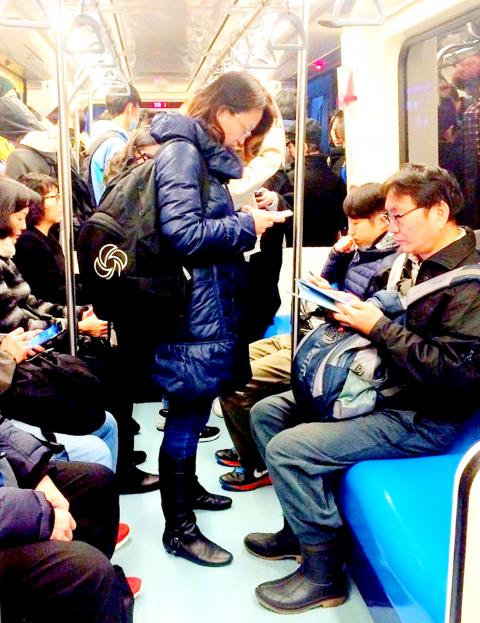Taipei Mayor Ko Wen-je (柯文哲) yesterday said that removing seats on the mass rapid-transit (MRT) system’s Wenhu line is among the options being considered to alleviate peak-hour passenger volume on the often overwhelmed line.
Ko revealed the plan at a forum attended by companies in the Nangang Software Park in Taipei, where traffic issues in the often-congested Neihu District (內湖) were discussed.
“The seats will probably be removed in the future. We will be able to fit in more passengers by asking them to stand,” Ko said.

Photo: Kuo Yi, Taipei Times
Another option being considered is to make the seats retractable, so they can be put away during peak hours, he said.
The plan to remove seats was quickly met with mixed reviews, with some residents interviewed saying that seats, especially the priority seats reserved for elderly people, pregnant women and children, are necessary.
Pressed to comment further on the options, Ko said that removing chairs is contingent on a plan to increase services along the MRT line.
“If the cars are not filled after the time gap between services is reduced, why remove the chairs?” Ko said.
He said the Taipei Department of Transportation briefed him on plans to alleviate passenger volume, and a more detailed plan would be announced in the middle of next month.
The Taipei Rapid Transit Corp (TRTC) said it has set out plans to reduce the gap between services on the Wenhu line from 85 to 80 seconds.
Meanwhile, Planning and Development Division chief Huang Hui-ju (黃惠如) clarified Ko’s remarks, saying that only one or two seats could be removed per carriage.
As much of the MRT’s machinery and power system is stored under the seats, the majority of the seats cannot be removed or retracted, Huang said.
Citing a TRTC assessment, Huang said removing one to two seats in each carriage would help to boost the line’s capacity by between 600 and 700 passengers per hour during peak hours.

Thirty-five earthquakes have exceeded 5.5 on the Richter scale so far this year, the most in 14 years, the Central Weather Administration (CWA) said on Facebook on Thursday. A large earthquake in Hualien County on April 3 released five times as much the energy as the 921 Earthquake on Sept. 21, 1999, the agency said in its latest earthquake report for this year. Hualien County has had the most national earthquake alerts so far this year at 64, with Yilan County second with 23 and Changhua County third with nine, the agency said. The April 3 earthquake was what caused the increase in

Chinese President Xi Jinping (習近平) is unlikely to attempt an invasion of Taiwan during US president-elect Donald Trump’s time in office, Taiwanese and foreign academics said on Friday. Trump is set to begin his second term early next year. Xi’s ambition to establish China as a “true world power” has intensified over the years, but he would not initiate an invasion of Taiwan “in the near future,” as his top priority is to maintain the regime and his power, not unification, Tokyo Woman’s Christian University distinguished visiting professor and contemporary Chinese politics expert Akio Takahara said. Takahara made the comment at a

DEFENSE: This month’s shipment of 38 modern M1A2T tanks would begin to replace the US-made M60A3 and indigenous CM11 tanks, whose designs date to the 1980s The M1A2T tanks that Taiwan expects to take delivery of later this month are to spark a “qualitative leap” in the operational capabilities of the nation’s armored forces, a retired general told the Liberty Times (sister paper of the Taipei Times) in an interview published yesterday. On Tuesday, the army in a statement said it anticipates receiving the first batch of 38 M1A2T Abrams main battle tanks from the US, out of 108 tanks ordered, in the coming weeks. The M1 Abrams main battle tank is a generation ahead of the Taiwanese army’s US-made M60A3 and indigenously developed CM11 tanks, which have

CASE COUNT: The deceased had advised law enforcement agencies regarding 60 fraud cases this year, leading to the confiscation of NT$9.3 billion in alleged illegal proceeds Prosecutors yesterday launched an investigation into the death of cryptocurrency expert Miffy Chen (陳梅慧), who died in a car crash on Wednesday under what some consider to be suspicious circumstances following her work with law enforcement to track down NT$9.3 billion (US$286.97 million) in alleged illegal proceeds. Prosecutor-General Hsing Tai-chao (邢泰釗) tasked the Hsinchu District Prosecutors’ Office with investigating the incident following requests from the Criminal Investigation Bureau (CIB) and other agencies with which she worked to crack several prominent cases involving financial fraud and money laundering. Chen was killed in a six-car pileup near Hsinchu in the northbound lanes of Sun